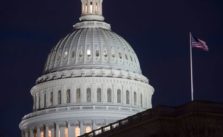On Friday afternoon, tribal leaders from throughout Indian Country were bracing for a partial government shutdown that loomed large after the Republican-led House of Representatives failed to pass a partisan, short-term spending bill with only 36 hours before the 2023 federal fiscal year ends at the end of the day on September 30.

Friday’s vote was 198 to 232, with more than 20 Republicans voting to oppose their party’s bill.
In the event, Congress does not act quickly to avert the shutdown, every federal department will be affected, with only essential employees being able to continue to work (without pay) and all other employees furloughed. Social Security, as well as Medicare and Medicaid benefits and payments are not affected by the appropriations process and would continue during a shutdown.
Tribal leaders heard from the White House and the U.S. Department of the Interior - Indian Affairs in two separate video calls late Friday afternoon to here from federal officials were provided overviews of what may be expected in the event of a federal government shutdown.
The White House provided a list of every agency’s contingency plans in case funding runs out. These contingency plans outline how the agency will handle the shut down.
Assistant Secretary of the Interior - Indian Affairs Bryan Newland (Bay Mills Indian Community) facilitated the video call with dozens of tribal leaders. He said Bureau of Indian Education schools will remain operational, as well as Bureau Indian Affairs (BIA) law enforcement, and child protection services will continue during a shutdown. Activities such as national policy development and tribal consultlation, trainings and travel will cesase during a shutdown.
"We have Department of the Interior contingency plans, including Indian Affairs, available," Newland said. "I want to emphasize Indian Affairs is going to continue to provide leadership in some communications duirng a shutdown."
Newland said those seeking information about how a federal government shutdown will impact their tribal communities can go to this website: https://[email protected]/shutdown
Earlier Friday, U.S. Agriculture (USDA) Secretary Tom Vilsack stated that funding for programs like WIC and SNAP could be cut within days of a shutdown because they lack sufficient contingency funding to operate longer.
Additional in the area of agriculture, tribal communities across the United States, often located in remote rural areas, face the risk of bearing the brunt of a federal government shutdown. They heavily rely on crucial federal services, such as agricultural extension, feeding programs, technical assistance, and resources for crop production, livestock management, and land conservation, all provided by USDA. The looming threat of a shutdown could worsen the challenges these communities already face.
"Tribal producers rely on federal grants and loans to sustain their agricultural operations, and a shutdown would delay or suspend access to capital, directly impacting dedicated farmers and ranchers who depend on these funding sources. It is unacceptable for any producers to worry about their financial stability due to political infighting in Washington. Agriculture impacts every individual who eats or depends on the land, so it's crucial to prioritize the livelihoods of those who work diligently to provide food and resources for our communities," Toni Stanger-McLaughlin, CEO of the Native American Agriculture Fund, said regarding the immediate consequences of a shutdown on tribal communities and agricultural producers.
More Stories Like This
Native News Weekly (August 25, 2024): D.C. BriefsNavajo Nation Mourns the Passing of Former Vice President Rex Lee Jim
Deb Haaland Earns Endorsement From Communications Workers of America Local 7076
University Soccer Standout Leads by Example
Two Native Americans Named to Democratic Congressional Campaign Committee's“Red to Blue” Program
Help us defend tribal sovereignty.
At Native News Online, our mission is rooted in telling the stories that strengthen sovereignty and uplift Indigenous voices — not just at year’s end, but every single day.
Because of your generosity last year, we were able to keep our reporters on the ground in tribal communities, at national gatherings and in the halls of Congress — covering the issues that matter most to Indian Country: sovereignty, culture, education, health and economic opportunity.
That support sustained us through a tough year in 2025. Now, as we look to the year ahead, we need your help right now to ensure warrior journalism remains strong — reporting that defends tribal sovereignty, amplifies Native truth, and holds power accountable.
 The stakes couldn't be higher. Your support keeps Native voices heard, Native stories told and Native sovereignty defended.
The stakes couldn't be higher. Your support keeps Native voices heard, Native stories told and Native sovereignty defended.
Stand with Warrior Journalism today.
Levi Rickert (Potawatomi), Editor & Publisher

